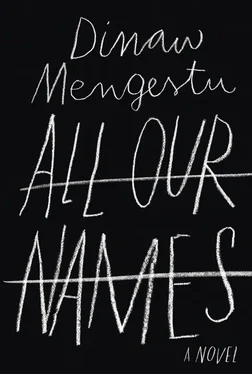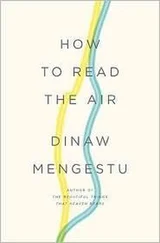I followed the back of his head out of the house. I didn’t look at the boys gathered around me or at any of the men in the other room. We slid quietly out the front door, and I heard a lock click behind us.
“Now it’s your turn to get us out of here,” he said. My map returned. I saw the exit I had charted earlier in my head and did my best to follow it, but nearly all the homes and stores had gone dark. Occasionally, a candle in a window gave off enough light so I could see the curve ahead, but by and large I was walking blindly. We were the only people on the road; the curfew had been in effect for hours. We turned left in what I hoped was the right direction. We made it a few hundred yards before we heard boots marching toward us, and then a familiar voice coming from a radio. We paused just long enough to hear the president’s speech from that morning growing louder as it approached us.
Isaac took hold of my sleeve and pulled me toward a small blue house a few feet ahead of us that had its front door slightly ajar. He guided me inside and closed the door hard behind him. Sitting on the floor of the house a few feet from us were an elderly man and a young woman, huddled around a single bowl and a candle they had deliberately kept as far away from the center of the room as possible.
For all their obvious terror, neither said a word after we entered. They stared at me, at Isaac, and then at the floor rather than at each other, as if they had long since come to terms with the fact that on any given evening men could burst into their house and do something terrible to them. There’s no honest measure for the toll that sort of knowledge takes, whether the scale is the breadth of a single room or an entire city.
Isaac did his best to comfort them. He crouched in front of the old man and, in the same tender voice I had heard him use with the beggar outside of the hospital, said, “Papa. Don’t worry.” He spoke to him for several more minutes in Kiswahili, the old man occasionally clicking his tongue in passive approval; eventually, Isaac stood up and told me, “We’re going to stay here for the night.”
“We can’t leave before then?”
Isaac shook his head. He looked down at the young woman, who, I saw now, was practically just a child. She stood up slowly. It was only when she put one hand under her stomach that I realized she was pregnant.
“If we’re all still here in the morning,” Isaac said, “we will be lucky.”
The girl disappeared into a room in the back. Isaac said congratulations to the old man, who for the first time smiled. He held out his right hand and for each finger uttered a few words before turning up and offering a prayer to his God.
“This is his fifth child,” Isaac said. “Two are dead, and two he hasn’t heard from in years. This one, he says, he hopes God will let him keep.”
The man stood with what seemed to be his last remnant of strength. I had seen him poorly as well, thinking he was simply older when it turned out he was almost elderly. The years were evident in his feet — in the nearly nailless, bald toes and the shriveled skin that encased them. He made his way to the back room to join his child-wife. I had an image of the two of them lying together side by side on a mattress on the floor, an image that didn’t inspire anger, as I would have thought, so much as pity for them, and, by extension, for us as well.
Isaac and I were standing in the middle of the room, which was bare except for a pair of wooden stools, a lone prayer mat in the corner, and a long hard wooden bench against the back wall, when we heard the first shot, followed by rounds of automatic fire. I was the only who looked around for a place to hide. Isaac didn’t so much as twitch.
“Take a seat,” he said. “We have a long night ahead of us.”
Isaac promised he would do his best to tell me what I wanted to know.
“I promise I won’t leave abruptly,” he said, but I never sincerely believed he would keep that promise, and so it meant little to hear him say it.
“I know that already,” I lied, “but that’s not what I want to hear.”
He reached out to put his hand on my shoulder but I moved farther away before he could touch me. The last thing I wanted was to be comforted. I got out of the bed. I saw my clothes lying on the floor and tried to think of something he could say that would make me leave.
“Henry said I would know better than he did where you would go next, but that isn’t true. I don’t know any more than he does. What was the point of having this dinner?”
“I wanted you to meet. So did Henry.”
“That’s because he knows nothing about you. He doesn’t even know where you’re from. How is that possible?”
“He never wanted to know more.”
“I don’t believe you.”
“When he met me at the airport, the first thing Henry asked me was ‘Who are you?’ He had a picture of my friend Isaac in his wallet — the same Isaac who died the night you came to my house. I told him the truth right then: The Isaac he was expecting was in a village in northern Uganda. He gave me his passport and visa so I could come here, because he never wanted to. I told him I became Isaac as soon as I stepped on the plane.”
“And who were you before that?”
“That’s what Henry didn’t want to know. He said the less he knew about me the better, in case something happened.”
“I’m not Henry.”
“I know.”
“Then why do you treat me like I am?”
He gathered the sheets around him. I wondered if I had actually hurt him, or if he was simply pretending to be wounded.
“I spent two days with Henry before I came here. We drove from the airport in Chicago to his house in St. Louis, where he said he would figure out what to do with me next. He had doubts about the story I had told him, and he said he would have me arrested and deported if he found out I was lying. I understood why he would say that. He had spent enough time in Africa to know there was no limit to what someone would do to leave. People risked their lives every day to get out. It was nothing to kill or steal from someone for the same reason.
“He made phone calls to find his friend Joseph. It was Joseph who had asked Henry to bring Isaac here. He thought if he could get him to America Isaac would be safe until the war was over. Early the first morning, someone from the British Embassy in Kampala called to say that Joseph was most likely dead, and that he and his army were rumored to be responsible for several massacres in the north of the country. I was sleeping on the couch when Henry received the call. He slammed the phone on the table. I thought he was pretending to be angry. He asked me what I knew about Joseph. I told him the truth. I said Joseph was dead.
“He sat down in a chair across from me. ‘When will you people learn?’ he said. ‘Do you enjoy killing each other?’
“I admit I had had the same thought before. I saw many people killed, as if it were nothing. I thought at times that our lives were worthless, but, hearing Henry, I knew that we were both wrong. No one needs to learn how to kill, but it took the foreigners who came to Africa to show us that it meant nothing to do so. Henry’s friend Joseph had many people killed before he died. I think now he had only done what the British had taught him.
“I said something similar to Henry: ‘What do you think your friend Joseph learned to do in England, while he was with men like you?’
“He was surprised I had answered his question. I was afraid I had offended him, but then Henry smiled and said, ‘You know what? You’re probably right.’
“There was another phone call from the British Embassy, later that afternoon. The Isaac that Henry was looking for was a colonel or captain in the same army that Joseph had once led. They were hoping to surrender, but not to the government — they wanted to surrender to the British. Isaac was one of three who signed the letter asking for their help. That was all Henry would tell me.
Читать дальше












